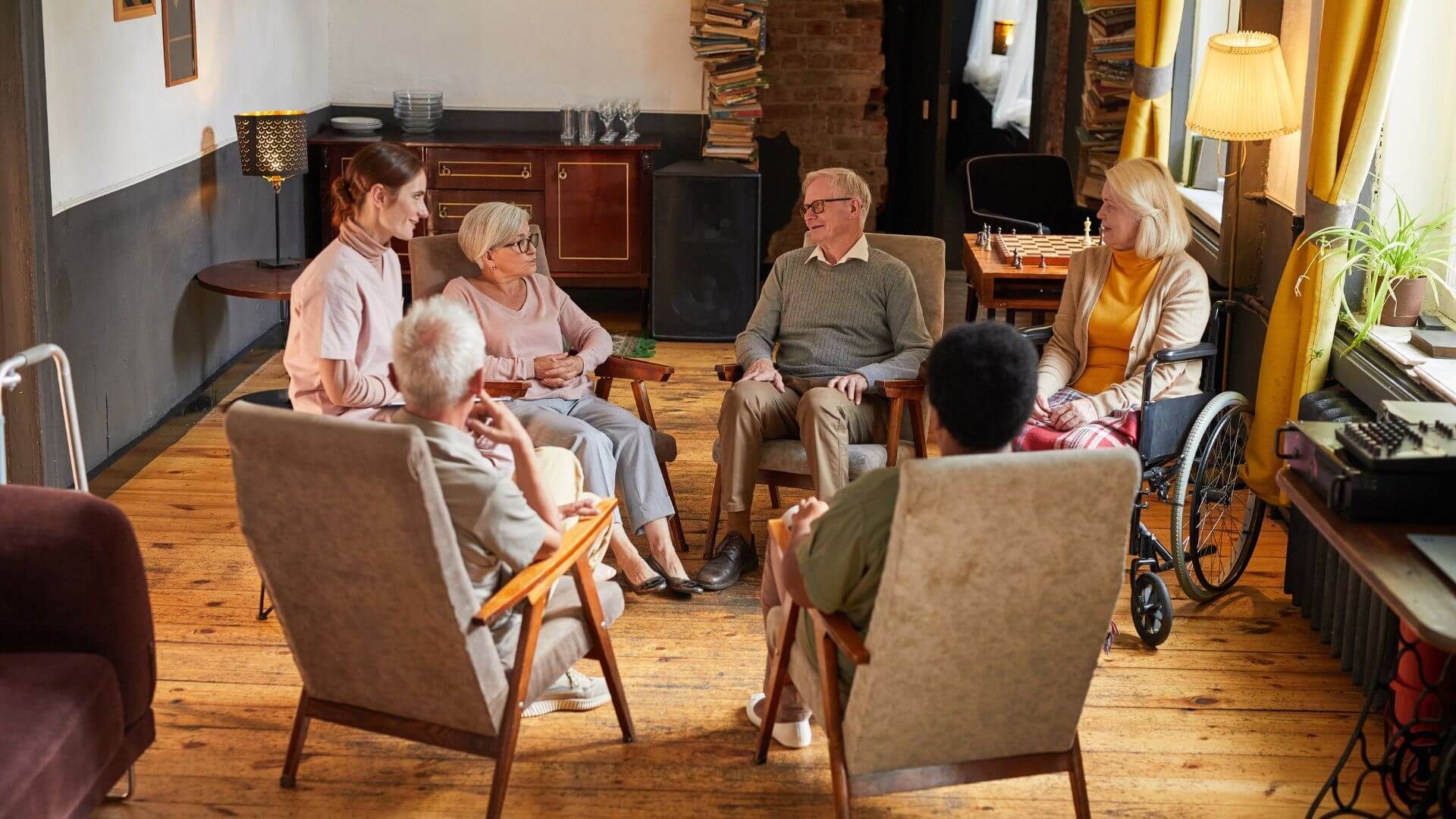Transitioning to assisted living in Rhode Island can be a seamless and fulfilling experience with the right approach and preparation. Start by engaging in open and honest conversations with your loved ones about their needs and preferences. Researching and visiting potential facilities will provide firsthand insight into the quality of care, amenities, and community environment.
Understanding the financial aspect, including available resources and assistance programs, is crucial in planning for a smooth transition. Packing thoughtfully and gradually moving personal belongings can help create a sense of home and ease the adjustment period. By taking these steps, you can ensure the transition to assisted living is as smooth and positive as possible for your loved ones.
Engaging in Open Conversations: Discussing Assisted Living with Loved Ones

Understanding Your Loved One's Needs
When discussing senior living options, it is essential to understand your loved one's specific needs and preferences. Whether they are considering assisted living communities, independent living, or specialized care such as memory care, knowing their requirements will help guide the conversation. Openly discussing their daily routine, medical needs, and personal assistance requirements will provide a clear picture of the type of senior living community that will best suit them.
Researching Assisted Living Communities in Rhode Island
To ensure a successful transition, it is vital to research various Rhode Island assisted living options. By visiting assisted living communities and independent living apartments, you can gain insight into the facilities, level of care, and amenities that each community offers. Engaging in these visits can also help your loved one feel more comfortable and involved in the decision-making process.
Discussing Financial Considerations

Understanding the financial aspect of senior living is crucial. It is important to talk about available financial resources such as Supplemental Security Income, potential assistance programs, and the overall cost of different senior living communities. Discussing medical costs, medication management, and memory care options can also help you plan for any potential financial obligations.
Planning for a Smooth Transition
Once a suitable assisted living community has been chosen, gradual planning for the move is essential. Encourage your loved one to pack personal belongings thoughtfully to instill a sense of home in their new environment. A gradual transition can ease the adjustment period and ensure that their move to a senior living community in Rhode Island is as seamless and positive as possible.
Visiting Potential Assisted Living Facilities in Rhode Island: What to Look For

Individual Needs Assessment
When visiting potential assisted living facilities in Rhode Island, it is crucial to assess how well the facility aligns with the individual needs of your loved one. Inquire about the care services provided, including memory care and support for daily living tasks such as bathing, dressing, and medication management. Understanding the specific services available will ensure that the residence can adequately meet your loved one's needs.
Quality of Care and Staff Training
The quality of care provided is paramount when selecting an assisted living community. During your visit, ask about the staff's training and experience, particularly in dealing with memory care and other specialized services. It is important to ensure that the staff is dedicated and well-equipped to handle the challenges seniors may face. Facilities like Brightview Commons are known for their commitment to exceptional care.
Recreational Activities and Social Engagement
Recreational activities play a significant role in maintaining the health and happiness of residents. Evaluate the range of recreational activities offered, from exercise classes and art workshops to social events and outings. Check if the facility provides transportation for residents to access various activities and appointments. Engaging in these activities helps residents live a fulfilling life and fosters a sense of community.
Dining Services
Quality dining services are essential for the well-being of seniors. Inquire about the dining options available, including the provision of three meals a day. It is also important to check if the facility can accommodate special dietary needs and preferences, ensuring that residents receive nutritious and enjoyable meals.
Financial Considerations: Monthly Cost and Insurance
Understanding the financial implications is a key aspect of choosing an assisted living community. Discuss the monthly cost of residence and compare it to your budget. Additionally, inquire about long term care insurance and other helpful resources or assistance programs that may be available to offset costs. This will help you plan for the financial future and ensure the chosen facility is affordable.
Family and Community Involvement

Consider the level of involvement that family members can have in the resident's life. Many facilities encourage families to visit often and participate in community events. This involvement helps foster a supportive environment and maintains a strong family bond. In places like East Greenwich, community and family engagement are highly valued aspects of daily life.
Safety and Accessibility
Ensure that the facility is safe and accessible for all residents. Look for features like handrails, emergency call systems, and easy access to common areas. Verify that the facility's design and layout support the independence of the residents while ensuring their safety.
Health and Wellness Services
Examine the range of health and wellness services available at the facility. This includes access to healthcare professionals, physical therapy, and support for chronic conditions. Verify that the facility offers comprehensive health services tailored to seniors' needs.
By considering these factors during your visits, you can make an informed decision and choose an assisted living community in Rhode Island that best suits your loved one's needs and enhances their quality of life.
Creating a Moving Plan: Packing and Transitioning to Assisted Living

Discover and Assess Your Loved One's Needs
Before initiating the move, it is crucial to discover and thoroughly assess your loved one's unique needs and preferences. Understand their current lifestyle, health conditions, and any physical or cognitive disabilities they may have. This knowledge will guide you in packing effectively and ensuring their comfort during the transition.
Secure Important Documents and Medications
Gather all necessary documents, including identification, medical records, and legal papers, such as power of attorney and housing information. It's also essential to secure medications, make a list of current prescriptions, and ensure there is an ample supply to cover the days surrounding the move.
Contact the Assisted Living Community
Stay in close contact with the chosen assisted living facility to coordinate the move. Confirm move-in dates, prepare for any required fees, and review their policies on what items residents can bring. Understanding these details ahead of time will help you plan and pack accordingly.
Create a Packing List

Develop a comprehensive packing list tailored to your loved one's age and needs. Include clothing, personal items, sentimental belongings, and essential furniture within the limited space available. This list will help ensure nothing vital is forgotten and provide a sense of familiarity and comfort for the new resident.
Prepare the New Living Space
Work with the assisted living staff to prepare the new apartment or room. Personalizing the space with photographs, favorite books, and other cherished items can make the transition smoother, fostering a sense of home in the new housing environment.
Plan for Transportation
Arrange safe and convenient transportation for your loved one. Depending on their mobility and health, you may need specialized transportation to cater to their needs. This ensures they arrive at their new home without undue stress or discomfort.
Unpack and Settle In
Upon arrival, help unpack and organize their belongings. Involve your loved one in the process as much as possible to ensure they feel in control and comfortable in their new surroundings. Familiarizing them with the facility's layout and amenities can also ease anxieties.
Pay Attention to Emotional Well-being
The emotional aspect of transitioning to assisted living is just as important as the physical move. Be attentive to their feelings and provide reassurance throughout the process. Encouraging visits from family and friends can help them adjust to the new environment while maintaining important connections.
By following these steps, you can ensure a well-organized and compassionate transition to assisted living for your loved one. This thoughtful approach will help them acclimate to their new surroundings and begin this new chapter with confidence and ease.
Personalizing Your Space: Making Assisted Living Feel Like Home

Understanding the Importance of Personalization
Moving into assisted living is a significant transition, and personalizing the new space can make it feel like home. Tailoring the environment to reflect the resident's personality and preferences is essential, especially in assisted living memory and memory care departments where familiarity can play a crucial role in daily tasks and routines.
Utilizing Personal Belongings
Bring cherished personal belongings such as photographs, artwork, and keepsakes from home. These items not only decorate the space but also serve as comforting reminders of fond memories. For residents in memory care, familiar objects can help stimulate memory retention and provide a sense of security.
Furniture and Layout
Arrange the furniture to create a functional and comfortable living area. Think about the resident's daily tasks and how the layout can support their independence. Ensure that essentials are within easy reach and that pathways are clear for safety. Personalized furniture arrangements can make the space feel more homely and welcoming.
Incorporating Hobbies and Interests
Incorporate items related to the resident’s hobbies and interests. Whether it's a bookshelf filled with favorite novels, a knitting basket, or a set of painting supplies, having these items accessible will encourage residents to engage in daily activities they love. This not only enhances their quality of life but also supports cognitive functions, especially in memory care settings.
Choosing Decor with Meaning
Select decor that resonates with the resident’s personality and past experiences. For those in assisted living memory care, decor that evokes positive memories or represents important life stages can provide emotional comfort and mental stimulation. The right decor can transform a generic room into a personalized sanctuary.
Collaborating with the Facility Staff

Work with the assisted living department's staff to understand what is permissible in terms of personalization. They can provide guidelines and suggestions for creating a personalized space. Their expertise in resident care allows them to recommend the best practices for incorporating personal touches while maintaining safety and accessibility.
Benefits of a Personalized Space
A well-personalized space offers numerous benefits. It helps residents feel more at home, promotes emotional well-being, and can even assist in managing memory issues in residents receiving memory care. A personalized environment fosters a sense of identity and belonging, making the transition to assisted living smoother and more positive.
By focusing on these aspects, personalizing the living space can significantly enhance the experience of moving into an assisted living facility. It ensures that each resident feels valued and cared for, making their new place truly feel like home.
Contact The Care Concierge of New England Today

Are you ready to make the transition to assisted living seamless and stress-free for your loved one? Contact The
Care Concierge of New England today! Our compassionate team is here to provide personalized support and guidance every step of the way, ensuring a smooth and confident move. Reach out to us to learn more about our services and how we can assist you in creating a comfortable and homely environment for your loved one. Let us help turn this significant life change into a positive experience.


